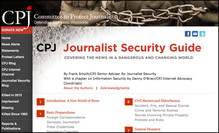
The press freedom group has published the findings of its analysis of press restrictions around the globe, to coincide with World Press Freedom Day tomorrow.
Eritrea is criticised in the report for "shutting out international media and imposing dictatorial controls on domestic coverage". Only state news media are allowed to operate, reporting to the country's information minister. The government expelled the last accredited foreign correspondent in 2007.
One exiled Eritrean journalist told the CPJ: "Every time [a journalist] had to write a story, they arrange for interview subjects and tell you specific angles you have to write on. We usually wrote lots about the president so that he's always in the limelight."
North Korea, Syria and Iran follow close behind in the league table, published today. Saudi Arabia is a new entry this year, in eighth place.
The list only features countries where the state imposes restrictions directly. In some countries, such as Somalia and Mexico, journalists practice self-censorship.
The CPJ research is based on 15 benchmarks, including blocking of websites; restrictions on electronic recording and dissemination; the absence of privately owned or independent media; and restrictions on journalist movements.
The top 10 is as follows:
- Eritrea
- North Korea
- Syria
- Iran
- Equatorial Guinea
- Uzbekistan
- Burma
- Saudi Arabia
- Cuba
- Belarus
Free daily newsletter
If you like our news and feature articles, you can sign up to receive our free daily (Mon-Fri) email newsletter (mobile friendly).
Related articles
- The freedom gap: what pay and class reveal about the future of journalism
- "No longer can a news outlet’s name guarantee the audience will come and stay"
- #JournalismMatters: The challenges of journalism in exile
- What to do if you are threatened with a SLAPP lawsuit
- WAN-IFRA: Five challenges to press freedom











